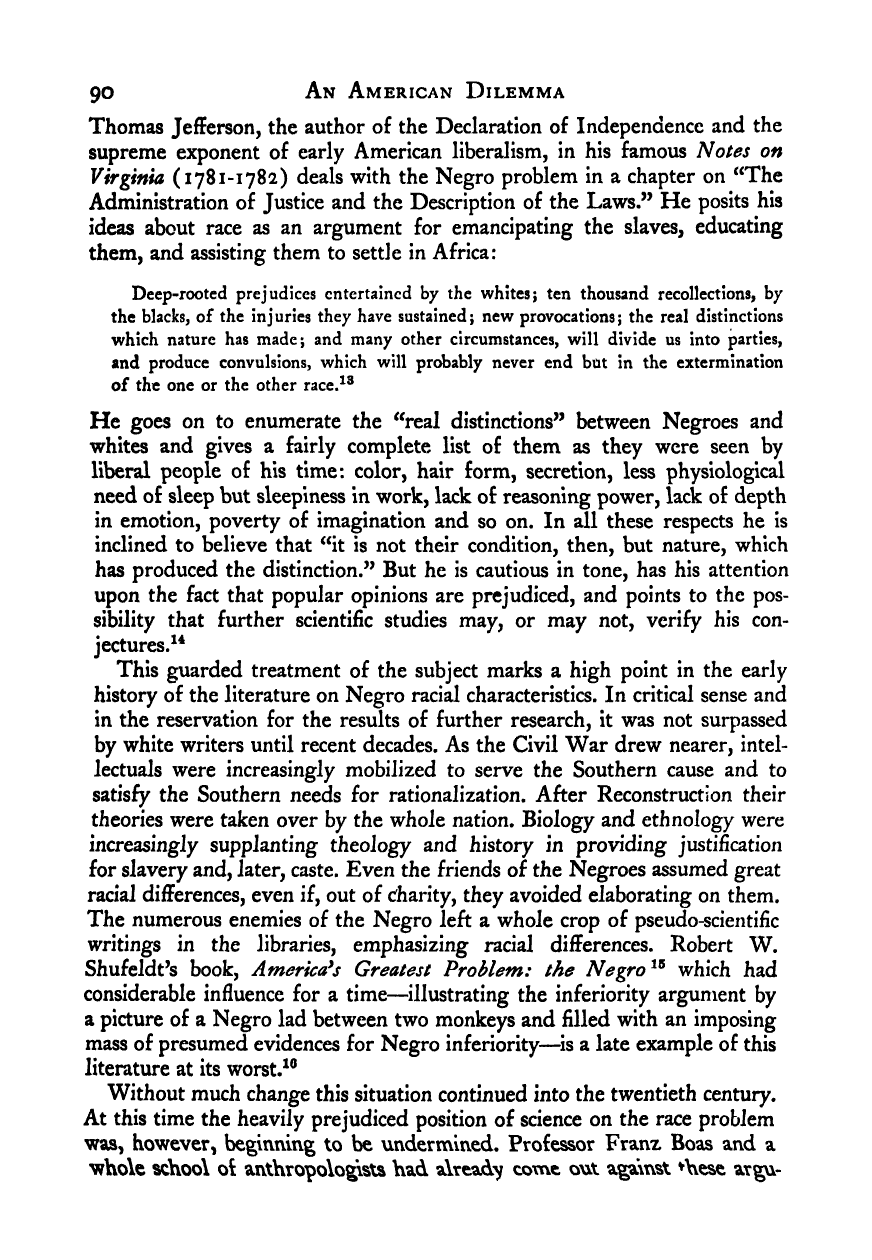Note: Gunnar Myrdal died in 1987, less than 70 years ago. Therefore, this work is protected by copyright, restricting your legal rights to reproduce it. However, you are welcome to view it on screen, as you do now. Read more about copyright.
Full resolution (TIFF) - On this page / på denna sida - II. Race - 4. Racial Beliefs - 4. Reflections in Science

<< prev. page << föreg. sida << >> nästa sida >> next page >>
Below is the raw OCR text
from the above scanned image.
Do you see an error? Proofread the page now!
Här nedan syns maskintolkade texten från faksimilbilden ovan.
Ser du något fel? Korrekturläs sidan nu!
This page has never been proofread. / Denna sida har aldrig korrekturlästs.
90 An American Dilemma
Thomas Jefferson, the author of the Declaration of Independence and the
supreme exponent of early American liberalism, in his famous Notes on
Virginia (1781-1782) deals with the Negro problem in a chapter on ‘‘The
Administration of Justice and the Description of the Laws.” He posits his
ideas about race as an argument for emancipating the slaves, educating
them, and assisting them to settle in Africa:
Deep-rooted prejudices entertained by the whites; ten thousand recollections, by
the blacks, of the injuries they have sustained; new provocations; the real distinctions
which nature has made; and many other circumstances, will divide us into parties,
and produce convulsions, which will probably never end but in the extermination
of the one or the other race.^®
He goes on to enumerate the “real distinctions” between Negroes and
whites and gives a fairly complete list of them as they were seen by
liberal people of his time; color, hair form, secretion, less physiological
need of sleep but sleepiness in work, lack of reasoning power, lack of depth
in emotion, poverty of imagination and so on. In all these respects he is
inclined to believe that “it is not their condition, then, but nature, which
has produced the distinction.” But he is cautious in tone, has his attention
upon the fact that popular opinions are prejudiced, and points to the pos-
sibility that further scientific studies may, or may not, verify his con-
jectures.^^
This guarded treatment of the subject marks a high point in the early
history of the literature on Negro racial characteristics. In critical sense and
in the reservation for the results of further research, it was not surpassed
by white writers until recent decades. As the Civil War drew nearer, intel-
lectuals were increasingly mobilized to serve the Southern cause and to
satisfy the Southern needs for rationalization. After Reconstruction their
theories were taken over by the whole nation. Biology and ethnology were
increasingly supplanting theology and history in providing justification
for slavery and, later, caste. Even the friends of the Negroes assumed great
racial differences, even if, out of c^harity, they avoided elaborating on them.
The numerous enemies of the Negro left a whole crop of pseudo-scientific
writings in the libraries, emphasizing racial differences. Robert W.
Shufeldt^s book, Americans Greatest Problem: the Negro^^ which had
considerable influence for a time—illustrating the inferiority argument by
a picture of a Negro lad between two monkeys and filled with an imposing
mass of presumed evidences for Negro inferiority—^is a late example of this
literature at its worst.^®
Without much change this situation continued into the twentieth century.
At this time the heavily prejudiced position of science on the race problem
was, however, beginmng to be undermined. Professor Franz Boas and a
whole school of anthropologists had already come out against ^hese argu-
<< prev. page << föreg. sida << >> nästa sida >> next page >>